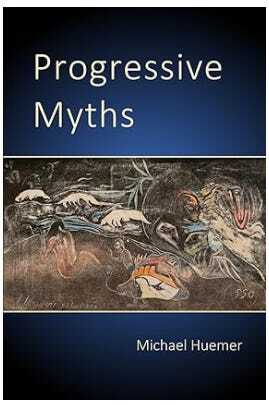T.C. Marti's Blog, page 4
February 5, 2025
Is the State an illegitimate band of robbers? Murray Rothbard has the answer

Survey 1,000 normies in your local area and I guarantee you that many will hold a double standard when it comes to what the State can and can’t do vs. if, say, the Individual committed the same atrocities. To them, the State has a ‘right’ to commit some of the following, but the individual cannot:
Tax
Print money
Kill
Harass
Spy
Of course, these are just a few instances in which quite a large number of people out there would claim that, because the State is above the individual (often without providing a shred of basis to justify such a worldview), it, therefore, has the right to commit what that same State would consider to be a crime if the Average Joe committed the same.
The Libertarian Book Reviewer is a reader-supported publication. To receive new posts and support my work, consider becoming a free or paid subscriber.
But in Anatomy of the State, Murray Rothbard drives a stake through that mindset. And he does so all over the book. But the first instance does a fine enough job of setting the stage.
Murray Rothbard proves the State is NOT above the IndividualWhile conducting research for this piece, I quickly consulted Anatomy of the State, going “old school” and reading the actual text while also going “new school” and listening to the audio version on Spotify.
Oh, and by the way, you wouldn’t believe how many libertarian-leaning books are available on the app. So if you haven’t done so yet, make sure you add this book and many others to your TBR and get cracking.
Thanks for reading The Libertarian Book Reviewer! This post is public so feel free to share it.
Anyway, let me share the stake Murray Rothbard drove through the argument that the State does have the power to do what it wants with its “subjects.” And yeah, I got quotes around that term for a good reason. Anyway, without further ado, Rothbard states:
Theft, in Other Words“It should be clear that the peaceful use of reason and energy in production is the “natural” path for man: the means for his survival and prosperity on this earth. It should be equally clear that the coercive, exploitive means is contrary to natural law; it is parasitic, for instead of adding to production, it subtracts from it. The “political means” siphons production off to a parasitic and destructive individual or group; and this siphoning not only subtracts from the number of producing, but also lowers the producer’s incentive to produce beyond his own subsistence.”
When one states something along the lines of, “The State taxes to provide for society,” or, the official Conformist Party line that, “Taxes are what we pay for a civilized society,” the quote above indicates that the opposite is, objectively, the case.
As Rothbard states in the above section, that, not only is taking something that was rightfully produced, or in some cases, earned, “contrary to natural law; it is parasitic,” but it robs more than just the producer or the earner and produces a snowball effect of distortions.
The consumer is also robbed since such siphoning “lowers the producer’s incentive to produce beyond his own subsistence.” This is why Rothbard goes on to say:
“In the long run, the robber destroys his own subsistence by dwindling or eliminating the source of his own supply. But not only that, even in the short-run, the predator is acting contrary to his own true nature as a man.”
At the end of the day, everybody loses, and it starts with the State siphoning goods, services, and, at the end of the day, money, be it through direct taxation, or the “hidden tax” of inflation. Something we’ve seen play out in the 2020s.
The VerdictEven with the evidence Rothbard pointed out, a critic could still claim the Individual is Subject to the State. But Rothbard closed this loophole. On page 16 of the text, Rothbard said,
“Since production must always precede predation, the free market is anterior to the State. The State has never been created by a “social contract”; it has always been born in conquest and exploitation.”
If we can judge what we’ve seen going on throughout the 20th century, starting with the conquest of Spain, in the American Empire and its rapid expansion of the State, it’s safe to conclude Rothbard is right in every single facet.
The day before I penned this slice of Anatomy of the State, Ron Paul wrote in his Weekly Report that we need to “Audit USAID…Then Shut it Down!” Paul couldn’t have driven the point home any better when he said,
“Behind most US foreign policy disasters overseas you will see the fingerprints of USAID. From Ukraine to Georgia and far beyond, USAID is meddling in the internal affairs of foreign countries – something that would infuriate Americans if it was happening to us.”
Paul also mentioned the New York Post piece Elon Musk reposted on X,
“Reporting that USAID funneled $53 million to EcoHealth Alliance to support gain-of-function research on coronaviruses at the Wuhan Lab! Did USAID help fund COVID? Americans have a right to know.”
Still think the State has a right to do whatever it pleases with its “subjects?”
The TakeawayThe message here is as clear as day: When popular thinking pretends the State is above the Individual, the State starts by lowering the prosperity of producers which, in turn, affects consumers. When it taxes to fuel its rapid expansion, it further lowers that prosperity by lowering the incentive to produce, and, in some cases, to consume, regardless if it’s a direct or a hidden tax.
When left unchecked, the State goes far beyond stealing from its own people. It extends its reach far beyond its borders, sticking its nose in places it doesn’t belong, and, perhaps ultimately, fueling worldwide crises.
That doesn’t sound like a benign entity that’s above anyone if you ask me. Instead, it’s a parasite that will destroy anything and everything in its path to maintain its stranglehold on those it’s tricked into worshiping. That said, the Individual must seek to contain the State, not defend its rapid and unjust expansion.
The Libertarian Book Reviewer is a reader-supported publication. To receive new posts and support my work, consider becoming a free or paid subscriber.
Arcane Awakenings, my prequel to the libertarian young adult fantasy series Arcane Elemental Academy, provides the basis for that argument. Young Yote Diamondback, who attends a heavily regulated private school, witnesses what happens when a teacher deviates from the lockstep of their State-mandated curriculum. What the pro-Statist Yote witnesses might just plant a seed to her awakening of all the evils her beloved State commits.
February 2, 2025
Spirit Prophecy’s usurper who makes Dolores Umbridge look like a saint

I recently mentioned that Spirit Prophecy is my favorite book in the Gateway Trilogy, and I’d call it my third-favorite book in the entire World of the Gateway, which includes the Gateway Trackers. Only Soul of the Sentinel and Gift of Darkness, Books Six and Seven in the Gateway Trackers, supersede it.
The Libertarian Book Reviewer is a reader-supported publication. To receive new posts and support my work, consider becoming a free or paid subscriber.
In what was once upon a time the final two books in World of the Gateway, you’ll find out that the Durupinen will go further to conceal a lie than maybe even the Intelligence Community itself. So much, that even spirits who know of these lies remain imprisoned in the bowels of some of the most notorious places on Earth.
But in Spirit Prophecy, E.E. Holmes plants the seeds. And early in the book, you’ll meet the main architect behind the corruption. Enter Marion of Clan Gonach’d. She’s around Jess and Hannah’s Aunt Karen’s age—and just for the record, if Holmes could go back and have used the name Karen for Marion, and Marion for Karen, that would’ve been great. If only this book was published a few years later…
Trust me, you won’t meet a bigger ‘Karen’ in any other book than Marion, and she’s one in the most toxic ways. Anyway, I’m getting off-track. Let’s just say Marion’s “poisoned honey” personality grows more aggressive as the novel continues. But she’s such a snake that it’s not until the end of the book do you realize that even Dolores Umbridge herself would look like an innocent saint next to the woman.
Like Mother, Like DaughterIn the third chapter of Spirit Prophecy, Jess has a rather unpleasant encounter with another Durupinen Apprentice, and this inciting incident sets the story in motion. The Apprentice is none other than Marion’s daughter, Peyton.
If you’ve ever watched a Lifetime flick that takes place in a high school and the antagonist is that rich, spoiled head cheerleader who’s so psychotic that she’d poison her own family to maintain her popularity and perfect reputation, that’s Peyton. And it doesn’t take someone born with half a brain to know where she’d gotten her personality.
Yep, her “good” old, but supermodel-looking mother whose favorite hobbies include shopping for designer fashion and leeching aether from spirits to maintain that youthful glow. And Marion isn’t shy about, in the most poisonous way possible, letting Karen, Jess, and Hannah know that they’re not welcome at Fairhaven Hall.
Guilt-Tripping Girls Who Committed No CrimeHer reasoning is simple: The way Jess and Hannah’s mother, Lizzy (also known as Elizabeth), left the Durupinen hanging nearly two decades before, which wreaked havoc on the Gateway. Never mind the constant fear Hannah lived in since she started chatting it up with spirits from her first memories, or the fact Jess basically acted as Lizzy’s caretaker since birth.
Nope, Marion held Lizzy’s blunder against Jess and Hannah the same way those demanding reparations like to pretend every one of us of Western European (I’m also of Northern) descent should be collectively guilty for the “financial effects of slavery and/or racial discrimination.” Makes no sense when you think deeply about it, especially since I can prove via documentation my own ancestors who originally settled in the Middle Colonies were Quakers. And per Tom Woods’ Liberty Classroom, Quakers were no fans of slavery.
Anyway, Marion’s demeanor turns more sinister as you dive deeper into Spirit Prophecy. Once Hannah’s rare, special powers come to the forefront, it sends select Durupinen into a panicked frenzy. Fueled by Marion, of course.
Yep, this woman loves to use the old fear-mongering tool to cloud her allies’ judgment. But guess what? The High Priestess, Finvarra, is having none of it, letting Marion know that the woman’s takes are nothing but ‘biased speculation.’
It’s actually never fully revealed whether Marion was also fearful of Hannah or if she used the girl’s ability as a lever. But nevertheless, she had her allies right where she wanted them, allowing her to call for a vote of ‘no confidence’ regarding the way Finvarra handled the situation regarding Hannah’s powers.
What’s the Big Deal?See, Hannah possesses an ability that could spell the end for the Durupinen Sisterhood, via a prophecy created centuries before her birth. Instead of facing that prophecy head-on, the Durupinen spent centuries trying to thwart that prophecy, which, of course, led to a few unnecessary deaths.
Since Finvarra made not a single move to try and rein in Hannah simply for the fact the girl possessed such an ability, the frightened Durupinen unseated her and inserted Marion as the new High Priestess. For Jess, Hannah, and their small band of allies, one of whom being Marion’s nephew, Finn Carey, it was a guaranteed prison sentence in the dungeons without due process.
But like all good books, it led to an epic climax, which contained quite an epic escape scene. Thanks to Marion, Jess and Hannah became fugitives, as the prophecy also pointed to Jess since it referred to a set of twins born to a Durupinen and Caomhnoir.
See, the Durupinen and Caomhnoir are forbidden from any kind of romantic relationship and are, by extension, fear-mongered into distrusting one another. Even if they’re forced to work together, as Caomhnoir are tasked with protecting the Durupinen from hostile spirits.
Yeah, that would suck, right? Anyway, at this point, they only fit the description of the girls mentioned in this prophecy, one Jess and Hannah’s own ancestor, Agnes Isherwood, concocted.
The Libertarian Book Reviewer is a reader-supported publication. To receive new posts and support my work, consider becoming a free or paid subscriber.
You can probably guess that yes, they are indeed the subjects of that prophecy, as this is genre fiction. It’s something you’ll discover in Spirit Ascendency. But, as you could probably also guess, Jess and Hannah never destroyed the Durupinen Sisterhood, even if the actions of Marion and her minions on the Council nearly led to its destruction.
A Better Approach Would’ve Saved Some HeartacheAs I said earlier, it’s unclear whether Marion feared this prophecy or if she was using such speculation as a mere lever to gain more power. Throughout the book, Holmes makes it sound like Marion does fear this. But given the woman’s personality, she could’ve easily used the Isherwood Prophecy as a lever to further her own ambitions.
I’ve read Spirit Prophecy a few times, but it’s been nearly three years since I’ve last “picked it up,” having listened to the work once in late 2022. That said, as I make my way through this current read, I want to dig deep and conclude whether Marion did, indeed, sway one way or another.
Either way, a better approach, such as studying the prophecy and utilizing the girls’ strengths to combat it, would’ve saved some heartache. And yes, there was a way to do just that. Unfortunately, Marion and the Durupinen, or at least the Northern Clans, weren’t having it.
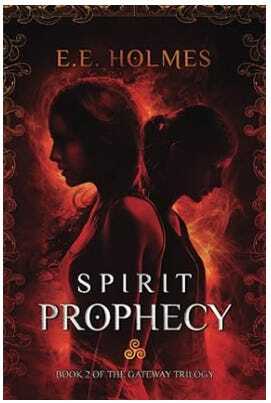
But, that’s not to say another group had the answer, and it’s one I’ll reveal later this year when I trek through Spirit Ascendency.
January 31, 2025
3 major messages Nothing but the Truth offers to more than just libertarians
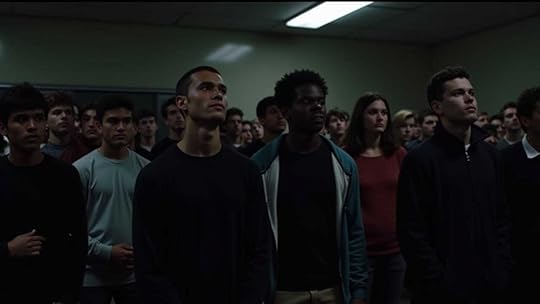
In a previous article, I went over a hidden message in Nothing but the Truth that libertarians would find enticing. But there are also more blatant messages and themes that a growing number of people, not just libertarians, can appreciate.
And yes, these three messages will bode well with libertarians, as we’ve seen all three of them played out during the first half of the 2020s more than perhaps any other time in American history. Okay, maybe that’s subjective, but you get the point.
The Libertarian Book Reviewer is a reader-supported publication. To receive new posts and support my work, consider becoming a free or paid subscriber.
We’ve seen politicians and so-called “experts” try to lie their way out of a bad situation, all while their media allies went to bat for them. And finally, we were all expected to trust them and their political allies in Washington, all of which wreaked havoc on the average American.
Such a fiasco may not be easy for young people to grasp. Luckily for us, Nothing but the Truth is a fine way for young readers to better understand these more complex situations.
So, let’s dive in.
Never try and lie your way out of a situationI’ve always lived by this mentality: If you lie, you’re gonna have to lie again, then lie again, and keep lying to cover up the original lie as the snowball effect builds. It’s something that would’ve done Philip Malloy well. Here’s a brief timeline of how his lies played out:
Hummed the National Anthem, but claimed he was singing the National Anthem
Philip repeated this lie to his parents, Ted Griffen, and journalist Ms. Stewart
Ms. Stewart wrote a slanted article in Philip’s defense
Article gained national attention, leading to near-universal support for Philip
Philip’s teacher, Margaret Narwin, faced criticism that led to her ultimate resignation
Narwin’s resignation made Philip Public Enemy No. 1 once he returned to school
Rumors swirled that students were starting a petition to force the truth out of Philip
Philip refused to return to school and instead switched schools
At his new school, Philip was asked to lead his new class in the singing of the National Anthem
Philip is then forced to admit the truth, stating, “I don’t know the words.”
I said in yesterday’s piece this entire situation could’ve been avoided if Philip had more options to work with as opposed to switching to another teacher, from whom he’d have been expected to learn the same material, or switching to a heavily regulated private school.
Still, had Philip simply told the truth and admitted he was trying to annoy Miss Narwin because he disliked her, the situation could’ve been avoided. Yeah, I get it, when you’re a ninth grader, facing the truth might be tough, but this book serves as a strong lesson that should encourage kids to look past the moment.
Thanks for reading The Libertarian Book Reviewer! This post is public so feel free to share it.
Tell the truth and face short-term consequences and long-term growth. Lie, and face short-term benefits and long-term consequences when that lie is finally unearthed. Broader options as opposed to what we traditionally see in schools would’ve helped for sure, but it still doesn’t excuse Philip from fooling the entire nation.
Trust the media at your own riskMs. Stewart was a local journalist and an ally of Ted Griffen’s who listened to and wrote a slanted story on Philip’s experience in Narwin’s class. At this point, Philip led his parents, Griffen, Stewart, and ultimately America into believing that he got suspended for singing the National Anthem as opposed to humming it.
That article hit the local papers, which was bad enough for all the parties involved, including Dr. Joseph Palleni, Dr. Gertrude Doane, and, of course, Narwin. But the article soon gained national attention, both in the papers and even on talk radio.
While Philip received letters and telegrams supporting him from people all over the country, Narwin became a national outcast and instead got scathing remarks. Stewart got her facts wrong, thanks to Philip’s victim mentality, and her article demonized who was implied to be the most popular and longest-tenured teacher at the school.
This one serves as a warning of why it’s not always wise to trust the media, especially those who have a clear-cut bias or even mistake the facts. Here, Stewart did try talking to all parties involved, but she ultimately only got one side, the wrong side, of the story. Still, she never got the full story, and wrote the article anyway.
Never put blind belief into politiciansTed Griffen might be my least favorite character in the book, and for good reason: He’s a local politician running for the school board who’s willing to ‘bend’ the truth to get his position. In the book, Griffen uses Philip Malloy’s lie as a platform for election, but it doesn’t come without him putting his own spin on it.
Malloy, who received a two-day suspension for humming the National Anthem - seen as creating a disturbance - in Margaret Narwin’s homeroom class, was never suspended in Griffen’s eyes. Instead, Griffen claimed Malloy was “expelled” for singing the National Anthem.
This is something you might miss, since Avi has a tendency to slip different words and phrases into the work. But when you listen to (or read) Griffen’s speeches closely, you’ll see that he claimed Malloy was ‘expelled,’ before going on a rant about how he’ll implement something along the lines of patriotic American values in the school district.
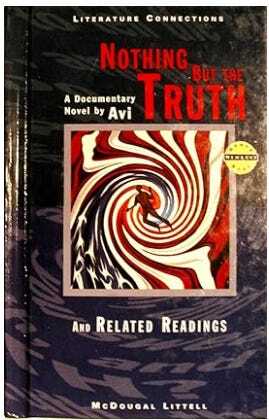
We never know if Griffen followed through on this, but he was persuasive enough to win the election.
January 30, 2025
One hidden libertarian message shines in Avi's Nothing but the Truth

If you asked me about my fondest memories in government school, literally from 1995 to 2009, I’d respond with, “I have few. Very few.” One of those few fond memories, however, came with books that we read in English (also known as Language Arts) class.
The Libertarian Book Reviewer is a reader-supported publication. To receive new posts and support my work, consider becoming a free or paid subscriber.
When I was in the eighth grade, we read Nothing but the Truth by Avi while our teacher sat behind the desk to continually fulfill their online poker addiction. And yeah, you read that right; they played poker while we read Nothing but the Truth aloud.
But it was actually kind of enjoyable, since, given the way Avi wrote the book, it contained a ‘documentary’ flair. And while I got one powerful memory, I can’t, for the life of me, remember who I “portrayed.”
Anyway, it doesn’t matter. Instead, I added the book to my TBR list as part of that New Year’s Resolution I mentioned about a month ago. Remember it? And I really wanted to include this hidden gem of a classic because its subject matter might make parents think twice about government schooling….plus other tidbits, but that’s not the focus of today’s discussion.
Let’s dive in.
One-Size, Don’t Fit All TeachersThe book’s centered around two main characters, Philip Malloy and Margaret Narwin. While Philip is the protagonist and Narwin is the antagonist, this book is intended for the reader to feel contempt for Philip and sympathy for Narwin.
But I don’t, and neither would any real critical thinker. Now, Narwin’s not a bad person, she’s an outstanding teacher, and plenty of students love her class, including Philip’s crush, Allison Dorsett.
The kicker? Philip can’t stand Narwin and while Narwin shows sympathy for Philip, he’s just not a good fit in her class. Now, don’t get me wrong, Philip’s not making much of an effort in Narwin’s class, and when he later has her for homeroom as well, he acts out. More on that later.
No, Philip’s not making his situation any better, but it’s clear that Narwin’s not a good fit for him, period. And as much as Philip pleads to the assistant principal, Dr. Joseph Palleni, to withdraw from Narwin’s class, he won’t concede to Philip’s wishes.
It’s also noted that Philip is an above-average student in his other classes, and he shows a knack for mathematics. So it’s not like he’s a deadbeat. But if a teacher ain’t a good fit, yet the decision-makers won’t grant Philip’s wishes to withdraw from her classes, there’s a problem.
Note, that Palleni did let Philip out of Narwin’s homeroom, but not her English class. This is one of many examples that, in government schools, just how little of a say students have in what’s supposed to be their education. Unfortunately, between 1991, 2009 (more on that later, too), and 2025, things haven’t changed much.
Philip Malloy isn’t a likable protagonist, but he’s got a pointOf course, readers will talk about how much of a compulsive manipulator and liar Philip Malloy is, and it’s true. The actual basis of this story works around how Philip gets in trouble while in Narwin’s homeroom class for humming the National Anthem when students are to, paraphrasing, “stand at respectful silence.”
Philip, however, claims he was singing the anthem, and he tells this lie to his next-door neighbor, Ted Griffen, who happens to be running for the school board. Griffen also has a journalist, Ms. Stewart, with him, who picks up on the story and writes an article in favor of Philip and demonizing Narwin and the school district.
Thanks for reading The Libertarian Book Reviewer! This post is public so feel free to share it.
So, the book itself serves as a nice, little warning to kids about the snowball effect of lying, and that’s not a bad thing. But that’s also not the point of this discussion.
A student like Philip, who is generally liked by his teachers (including Narwin) and peers, never should’ve been in Narwin’s English class to begin with. This would’ve been the case if he wasn’t attending school in the “One-Size, Doesn’t Fit All” government-funded zone.
Narwin also quips something along the lines of “if only I can get through to him” a few times, but Philip’s dislike of her prevents that. Sure, many readers will pin this on Phillip, and he bears responsibility. But it’s clear, as I’ve mentioned previously, that he’s not a good fit for her, and Avi gives us enough evidence to show us that Philip’s not a bad student, as he shared his other grades and mentioned that Philip had a clean record.
No different from when I and many of you were in schoolOkay, let’s circle back to my eighth-grade year, in which my own English/Language Arts teacher cared more about playing poker than they did teaching the class. While they had their moments, it’s clear that they held nothing more than a job title and that was about it.
Flashback to seventh grade and our teacher barely got on well with many of their students. Funnily enough, I had this same teacher in my junior year of high school, and nothing had changed.
Those I had in fifth, sixth, and ninth grade weren’t bad, but their classes were forgettable. Hardly a single student out there would’ve gone to bat for the tenth-grade teacher, who possessed a Dolores Umbridge-like aura. As for who I had in my senior year, I can’t judge, as they were in their last year themselves and ready to retire.
The common denominator? There was only one teacher for everyone in fifth, sixth, seventh, and eighth grade, and two for my ninth and tenth-grade years. But here’s the catch: The other teacher during those early high school days taught basic English/Language Arts while the rest of us were in the college preparatory classes.
By the time I entered my junior year, it was back to that ‘one-size, fits some’ teacher since about half the graduating class jumped ship to the local trade school. That said, there were a good 100 kids, broken into smaller classes of roughly 25 students, per teacher.
The same went for math, science, and history, in case you’re wondering. As you might’ve guessed, not every teacher was a good fit for me. In fact, very few were.
Don’t be afraid to try new thingsMy theory is that a lot of parents, even to this day, still send their kids to government schools without thinking twice is that they were ‘good enough for them.’ But were they? Did my parents care much when they were in school? The answer is no, something they both admitted to. Heck, Dad “didn’t know what a ‘B’ looked like.’
So, I doubt it was a great fit for either of them, and my grandparents also weren’t exactly honors students. Of my dad’s two siblings, it’s the same result. As for my mother’s four siblings, one of them excelled. Do the math, and that’s a 12.5 success rate in playing the game of school well. Not the most encouraging results, and it’s a system that needs an overhaul.
Overall, it’s just a sheer lack of choice, and it’s something that Avi made clear in Nothing but the Truth. Yeah, Philip was a liar and he let that lie increase exponentially. But that still shouldn’t take away the failure of the government schooling system that, if Philip had other options, he may have enjoyed English class a little more, especially if it was geared more toward his strengths.
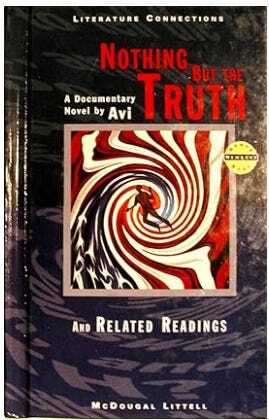
This is something I make clear in my upcoming work, The Arcane Prophecy (check out the free prequel here). While Yote Diamondback excelled in her heavily regulated private school - her family’s rich - she discovered she still had a lot of untapped potential at the Arcane Elemental Academy.
January 29, 2025
Introducing the Cursed Mage trailer and other fun bookish tidbits
It’s hard to believe that it’ll be just one month before my first-ever “big project,” Cursed Mage, is out and ready to roll. I wrote the first draft of this paranormal/occult fantasy back in the early spring of 2023, so it’s making full circle here in 2025 and it’s taught me a lot.
The Libertarian Book Reviewer is a reader-supported publication. To receive new posts and support my work, consider becoming a free or paid subscriber.
For one, I proved to myself I could write more mainstream genre fiction as opposed to the niche works I started off writing, even if my dark epic fantasy that I’m currently rebranding, Spirit and Fire, gave me a few signs.
But I wouldn’t have made it this far without having read some awesome books that inspired it, mainly E.E. Holmes’ Gateway Trilogy. I’ve been talking a lot about Spirit Legacy and Spirit Prophecy lately, and there’s a reason behind that, given the Holmes’ classic’s direct influences on my work.
That said, the Gateway Trilogy is just a speck of dust in terms of influences, something I wrote about in an earlier post. But anyway, enough about Cursed Mage. I also wanted to take this time to share a few more fun, book-related tidbits that you might get a kick out of. Nothing Cursed Mage-related, by the way.
Dirt Town’s the toughest read lately, but not for a bad reasonI mentioned the book Dirt Town recently, one that’s written by a mother-son duo. Pretty cool, if you ask me, but wow, it’s so hard to read fiction from my computer screen. Especially these days, when I’m old school and insist on reading at least paperbacks.
In that earlier article, I mentioned this one would be 50-50, as it’s a work about class differences. Of course, every time we see something like that, it always makes me wonder whether the authors’ purposes here were to spread the ill-fated yet still oft-endorsed Marxian ideology, or if this was a political/cronyist class going against the masses.
If there’s any solace, it’s that my own work, Spirit and Fire, also talks about class differences. But I think you can safely assume there’s not a drop of Marxist ideology to be found.
I’m nothing, nothing, Nothing but the Truth…I’m very hard at hearing, so I probably didn’t get those song lyrics right from that episode of Hey Arnold when Arnold and Gerald dialed up a song using Dino Spimoni’s (I probably botched that name, too) lyrics and his music partner’s melody.
Thanks for reading The Libertarian Book Reviewer! This post is public so feel free to share it.
Anyway, I’m not entirely old school, I guess, since I’m currently listening to Nothing but the Truth by Avi on Spotify and I’ve since uncovered a hidden message in the work. It’s written in an 1,100-plus-word article I already drafted earlier this week, so stay tuned for it.
Let me just say that, if you don’t like government schooling, you’ll love this review more than anything else. No, the protagonist isn’t the most likable, and he definitely deserves a lot of flack here. But it doesn’t diminish the one hidden message I found, and one that my eighth-grade teacher - who preferred to play online poker during class than teach - would’ve spoken about.
If you ever read this book that was published all the way back in 1991, you may’ve had a vendetta against Philip Malloy and sympathy for the antagonist, Margaret Narwin. While you’ll still have that antagonistic sympathy because Narwin really isn’t a bad person, you’re also about to feel for Philip after I’ve had my say.
From Dawn to Decadence by Jacques BarzunThanks to Jon Miltimore’s Substack, The Take, I was introduced to Jacques Barzun’s magnum opus, From Dawn to Decadence: 500 Years of Western Cultural Life. It’s “required reading,” per Miltimore, so late last year, I decided to pick up a copy.
Since the book is so long - about 800 pages - and the writing is so small, I thought I’d turn this one into a year-long odyssey throughout the greatest civilization that the world has ever seen. That said, I’m reading only a few pages a day, and I should have it finished up by December 31st of this year.
The Libertarian Book Reviewer is a reader-supported publication. To receive new posts and support my work, consider becoming a free or paid subscriber.
And yep, you’ll know when it’s done since I’ll have a full review on what has so far been a very, very interesting read.
January 28, 2025
7 reasons libertarians will fall in love with Spirit Prophecy

A story of two sisters looking to fit in alongside a flaming gay (seriously, no exaggeration) teenage spirit might put on the facade that Spirit Prophecy, like so many other books, carries a woke message. But that’s like saying Wizarding Supremacists in Harry Potter are akin to the far right when, in fact, most of the latter just hate Muggles for their suppression of witches and wizards in years past.
The Libertarian Book Reviewer is a reader-supported publication. To receive new posts and support my work, consider becoming a free or paid subscriber.
Sounds more like there’s a definite far-left tilt to the likes of Salazar Slytherin, Lord Voldemort, and similarly-minded people when you think critically on the subject. Slytherin hated what Muggles were doing to his kind back in the 990s and wizards like Voldemort also wanted to put Muggles in “their rightful place,” or something like that.
Anyway, one reason I even started this page was to take a deep dive into some popular works like Harry Potter, but also mid-tier ones like the Gateway Trilogy, and offer an alternative viewpoint on their subject matter.
I’m neither accusing J.K. Rowling nor E.E. Holmes of being libertarian crusaders by any stretch. They’re not, and their work was probably never intended to carry libertarian meanings.
That said, when you break down books like Spirit Prophecy, it does a much better job of critiquing the Left as opposed to the Right, or those in libertarian spheres. This comes despite the emphasis on “breaking tradition,” which is also more associated with the Left. Let’s discuss.
Blaming BloodlinesYep, I got this one straight from the DEI handbook. I watched an excellent exchange on X between John Stossel of Reason and Erec Smith, and he explained the real issues behind the mentality.
I’ve mentioned this before, but looking outward and blaming ‘white privilege’ for one’s own shortcomings is nothing short of a victim mentality. While that’s far from the case in Spirit Prophecy, blaming Durupinen newcomers Jess and Hannah for their mother’s mistake is, well, just as short-sighted.
Neither one of them made the decision Lizzy made to leave the Gateway in peril, yet here they are, taking the blame for it from many different angles. Jess and Hannah have nothing to apologize for, and neither do you if the DEI world considers you to be privileged for committing the crime of possessing a certain genetic makeup that you never chose to possess.
Twisted CensorshipCensorship and the relentless advocating for censorship, such as the ill-fated Disinformation Governance Board, will forever be tied with Joe Biden. You see something like this play out in Spirit Prophecy, but on a larger scale.
As the title suggests, there’s a certain prophecy the Durupinen don’t want to see anyone fulfill. And one such spirit happened to be suspected to have the ability to fulfill the prophecy centuries before the book’s events.
So, the Durupinen not only censored this kid by killing her; they also censored her spirit through some sick, twisted ritual. And if you read the sequel series, the Gateway Trackers, this kid isn’t the only spirit the Durupinen used some twisted means to ensure she stayed quiet for centuries on end.
Committing the Crime of…Owning a specific talent. You get a nice, little look-in during Spirit Legacy’s climax, but you learn something significant about Hannah in Book II. See, Hannah’s someone the Durupinen will fear fairly quickly, because she has a specific ability, and one that, in the modern day, could lead to the fulfillment of that prophecy I mentioned earlier.
Thanks for reading The Libertarian Book Reviewer! This post is public so feel free to share it.
Not only is Hannah (and Jess) an outcast; some Durupinen want her locked up for, well, possessing an ability she never asked for. Yeah, these people are pretty twisted.
Real InsurrectionsIn early January, the legacy media often pretends that the January 6th, 2021’s “insurrection” was an attempted coup. If that was the case, it was the most poorly planned coup in world history, as nobody present seemed to possess the slightest iota of how a coup actually works.
Unfortunately for Jess and Hannah, a few members of the Durupinen Council did their homework and the book’s primary antagonist seizes power. Oh, and she didn’t do it by storming Fairhaven Hall with a bunch of random protestors.
No, it was a carefully crafted and executed coup. It would’ve been bloodless, but Hannah had other ideas if she wanted to save herself from the new regime’s wrath.
Good Guys (or Girls) Don’t ExistThink the Durupinen are bad people? Well, I wouldn’t. Not yet. They’re twisted and somewhat inhumane, but they’re merely the ‘lesser of the two evils.’ Yeah, there’s an organization that’s a little more twisted, evil, and sick out there.
Sounds familiar, don’t it? Hey, this is one of those stories in which you can count the number of good guys on one hand. You might not have any fingers left over, which is at least somewhat encouraging, but there’s dark gray, darker gray, then the good guys.
Lies, Lies, and More Lies from AuthoritariansYou ever hear the old saying, “Believe none of what you hear and half of what you see?” Yeah, when you read Spirit Prophecy, engage in the same kind of caution. You’re gonna get a lot of lies here, a few truths, or would-be truths, then more lies.
The best one of which is how the male branch of this secret society, the Caomhnoir (keev-noor), resist so-called “temptation” from the Durupinen “temptresses.” Yep, their families brainwash them years before they even step foot into Fairhaven Hall.
And even if they aren’t brainwashed, they’d do well not to cross that sanctity line. Bad things happen if they do.
Because it’s Freaking EntertainingHey, of the Gateway Trilogy, Spirit Prophecy is my favorite of the trio for the reasons listed above. I also love how, while Jess may be in the driver’s seat here, you can’t help but care more about what happens to Hannah, given her ability and the connection she shares with one of those perma-censored souls.
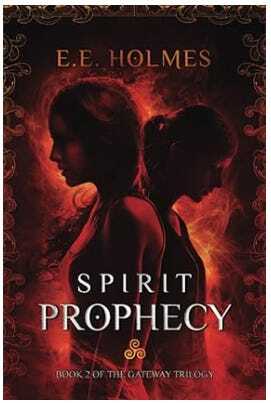
As I’ve often mentioned: E.E. Holmes likely never sat out to create a libertarian-friendly work, and you’ll catch on that just by reading it. But nevertheless, she concocted a book that a lot of libertarians who, in turn, would rather read fiction, can appreciate.
January 26, 2025
7 ways Spirit Legacy inspired Cursed Mage

In many ways, my upcoming book, Cursed Mage, borrows about as much from Spirit Legacy as English does from Latin. And no, seriously, just research how many English words have their roots in Latin, and prepare for those shockwaves to course through your soul’s shell.
The Libertarian Book Reviewer is a reader-supported publication. To receive new posts and support my work, consider becoming a free or paid subscriber.
Then, go to Duolingo, learn Latin, and claim that you’re fluent. You probably will be once you realize just how far ahead of the curve you already are. Anyway, as I write this, I got Spirit Legacy entrenched on my end table, so I thought I’d end (or begin) the week with seven tidbits that I borrowed from the work and put into my own.
You won’t get much in the way of a libertarian read here, so I thought I’d forewarn you ahead of time. But don’t worry, don’t worry. Some awesome, upcoming content on Spirit Prophecy and Spirit Ascendency will entertain any liberty lover, as opposed to the glorified prequel that is Spirit Legacy.
And no, that’s not a knock on the book, even if I gave it a few in my previous post. Anyway, let’s get after it.
1 - Campus HauntsOh yes, St. Matt’s and Fenn U see plenty of paranormal activity, and sensitives like Jess Ballard and Kaija Jokiharju will naturally attract them. Well, kind of. In Jess’ case, they literally want to break through and enter their ‘final home’ through her. At least Kaija only had to deal, for the most part, with one spirit.
2 - Magical CastlesWhile Spirit Legacy scratches the surface with Fairhaven Hall, Kaija gets a full blast of Linna Yliopisto, or Castle University, in Acts II and III. There’s just something about fantasy fiction and magical castles. But don’t worry, dear reader, because neither one of them is Hogwarts, unfortunately.
3 - Those Rich Aunts and UnclesSuch an overused but effective trope here. Jess’ Aunt Karen and Kaija’s Uncle Vaino are freaking loaded. The sad part is that Jess and Kaija both grew up living rough lives, and all this time they had some well-off relatives. Hey, it pays to have connections, right?
4 - Irrelevant Non-Blood RelativesAs for Uncle Noah (Jess) and Aunt Olivia (Kaija)? Goodness, neither could be more irrelevant. But if I could take my pick, I’d roll with Noah. At least he likes baseball, a sport I follow when I feel like it, especially if the Diamondbacks are winning.
5 - All Gothed UpJess and Kaija both rock that emo/goth look. And to be honest, it looks good on them both. Or, at least Jess’ roommate, Tia Vezga, thinks Jess looks great in it. As for Kaija, I pictured the look before I even wrote the first draft, given her light skin tone but dark hair; it’d just look elegant on her.
Thanks for reading The Libertarian Book Reviewer! This post is public so feel free to share it.
6 - Feeling Elemental?Both books contain elemental magic, albeit in different ways. You just see the elemental magic played out toward the end of Spirit Legacy, and it’s used in a ritual. As for Cursed Mage, it appears in some high-stakes battles the main characters find themselves in.
7 - Family SecretsYup, another good old trope. Not only are those aunts and uncles loaded with money; they’re chockful of secrets. Secrets they’re not willing to tell their curious nieces. But hey, at least Jess is a Durupinen and Kaija’s a Mage. Could you imagine having rich, magical relatives and possessing not a drop of their blood in your veins? It’d be a boring life.
And That’s a WrapOn Thursday, January 23rd, I finished my first draft of Astray Mage, and it’s where the libertarian concepts take off in my own series. As for Spirit Legacy’s sequel, Spirit Prophecy, it’s got the same thing coming.
I think I’ve mentioned this before, but the Durupinen are prone to acting in ways so negative that I haven’t unveiled exactly what they’ve done, or what Jess finds out they’ve done, in Spirit Prophecy. To many, it’s horrifying, but to a libertarian, we’d find it very, very unsurprising.
January 23, 2025
Why Spirit Legacy will never be a 5-star read even if it’s an all-time favorite

What if I said you can love a book while acknowledging it’s not the greatest read in the world? Yeah, that’s the case with Spirit Legacy, which despite serving as a prominent series starter, is nowhere near a 5-star read.
The Libertarian Book Reviewer is a reader-supported publication. To receive new posts and support my work, consider becoming a free or paid subscriber.
But then again, it’s even hard to call Harry Potter and the Philosopher’s (Sorcerer’s) Stone as such, given the number of plot holes in the first chapter alone. I could probably devote an entire article to the subject, but that’s not why I’m talking about Spirit Legacy in such tones.
Instead, there are two things wrong with this book that have always made it a four-star read:
Jess Ballard’s Aunt Karen’s refusal to explain what she was, and
The fact Jess and Karen had to rescue Hannah with no real help
Oh, and in case you’re wondering what this review has to do with libertarianism, let’s just say that you can sense a little corruption early on when you read this thing. E.E. Holmes doesn’t elaborate much, but she clues you in some on that notorious Council. Anyway, let’s get to it.
Karen’s RefusalWe find out very early on that Jess sees spirits and it’s something that Karen would know the symptoms of early in the work of what was going on. Heck, we can even point out that Karen may’ve known about Jess’ ability as early as Chapter 2 when Jess’ supposedly senile grandfather confronts her in the nursing home he’s living in that he’s “seen it.”
Yet, Karen even goes as far as to lie to Jess at Christmas regarding this mysterious, blank, ancient book that appeared under the tree. Karen claims she gave it to Jess and forgot about it, but her reaction upon seeing the book told us all this was a poorly crafted lie.
Later in a subsequent scene, Jess overhears Karen speaking to a woman named Finvarra. And it doesn’t take long for Jess to realize that she’s the subject of the call and the book is also mentioned.
Thanks for reading The Libertarian Book Reviewer! This post is public so feel free to share it.
It’s not until a horde of restless spirits nearly kills Jess does Karen finally crack. Of course, Karen still acts like she can only tell Jess so much, but a subsequent visit from two Durupinen finally forces her to reveal the truth.
While Karen may not have known Jess was born with the ability is plausible, I digress. Karen knew about Jess’ “talent” for seeing and interacting with spirits. She saw Jess holding the Book of Teigh Anonn. She even hesitated to talk when Jess ended up in the hospital thanks to those restless spirits trying to literally rip her apart so they could cross through her and into the aether.
Yeah, the Durupinen are an ultra-secret society shrouded in mystery and all. I get that. But a corporate lawyer like Karen would have logistically known better the second Jess interacted with Evan’s spirit.
What was her reasoning? That she kept a promise to Jess’ mother, Lizzy, to never reveal any of this to Jess before the book’s events. That, and Finvarra apparently didn’t give permission to reveal anything, either. For me, it was hard to believe this entire rhetoric.
Rescuing HannahDespite having nearly 15,000 reviews and ratings at the Zon, Spirit Legacy is still nowhere near Harry Potter or Hunger Games in popularity, so there are some names I didn’t want to drop to spark curiosity. That would’ve been the case here had I not inadvertently revealed some details in a previous post.
Now, before I critique this point, I do want to say this: Long-lost siblings are among my favorite tropes regardless of the genre. That and the evil relative narrative except for when Star Wars does it to try and hone in some original trilogy nostalgia.
Anyway, before I dive further off-track, a pair of Durupinen named Catriona and Lucida pay Jess and Karen a visit. They reveal they’ve located the long-lost sibling, Hannah, but they do nothing more than give the aunt-niece duo an address of a psyche ward that the girl’s residing in because her “talent” manifested at a much younger age than Jess’.
Why they didn’t just use their influence to bail the girl out themselves is something that’s been lost on me for ages. Every time I read this book, I always think I missed something to explain this and so far, I’ve come up with just one explanation: Catriona and Lucida, especially Lucida, love entertainment at the expense of others.
In other words, you’ll learn in later books that the two are pests who openly don’t care for Jess. So, maybe they’d just have found it funny to task Jess and Karen with the bail-out and nothing more. Yeah, Lucida said she and Catriona would help at one point and Karen denied her. But, whether Lucida was serious here is a topic of discussion.
Corruption ForeshadowedIf I were to make an educated guess, the Durupinen are the most powerful people in Jess’ world. So, naturally, they’re a corrupt bunch. If there are positives to be taken from these two criticisms, it’s just that: In both instances, there’s some leeway here.
Clearly, Karen knows what’s going on with Jess, but to her defense, she also doesn’t know about Hannah, the key to Jess’ Gateway. Since Durupinen always come in pairs, it’s plausible that Jess was more of a sensitive than a fully-fledged Durupinen.
The Libertarian Book Reviewer is a reader-supported publication. To receive new posts and support my work, consider becoming a free or paid subscriber.
Secondly, Catriona’s and Lucida’s refusal to help Jess and Karen rescue the sister shows off a ‘because we can’ mentality. Why track the girl down without actually partaking in the rescue? ‘Because we can.’ And that’s how the Durupinen act. So, while it doesn’t make sense on the surface, it’s understood more in later books.
January 21, 2025
The Waterboy: A Rise of the Grigori Origin is one outstanding prequel novella

Confession time: I'm not the easiest reader to impress. Far too often, I'll lose interest in a book within a few pages, before turning my attention elsewhere. This wasn't the case with The Waterboy by Talena Winters. This novella had trouble brewing within the first few pages, and that trouble just kept boiling over with the action picking up every time I turned the page.
The Libertarian Book Reviewer is a reader-supported publication. To receive new posts and support my work, consider becoming a free or paid subscriber.
In it, we meet Zale, a boy who never touched water, and for good reason. Once immersed in water, he becomes a human-hybrid sea creature. But once he's back on land, he's fully human again. It was a cool, innovative aspect that I've never come across in the many books I've read.
Bonus points for Winters: She not only concocted a cool concept; she pulled it off well. But Zale was horrified when he found out what he was. This caused him to run away from home, believing himself to have a deformity of some sort.
The Waterboy left me asking some good questionsI've come across readers who want complete resolutions, even in prequels. Other readers like myself love cliffhanging suspense. This one gave me the latter, and it made me want to dive more into this awesome world.
Thanks for reading The Libertarian Book Reviewer! This post is public so feel free to share it.
I’ve already put The Undine’s Tear and The Sphinx’s Heart onto the growing TBR list and one that will likely last well into 2026 and beyond. But, having been introduced to Winters’ work already and concocting more than a few critical questions surrounding this awesome world, I’ll be bumping these ones up into the 2025 range.
This book, in which Zale seemed to think he’d found a family willing to take him in, took a turn when he decided to leave following a short stay with them. I don’t want to dive too much into detail here for obvious reasons, but let’s just say this one ends in a rather dark, albeit interesting way.
Let me just say that, toward the end of the book, you’ll learn something significant about this makeshift family he’d found. And that’s where all those questions lurk.
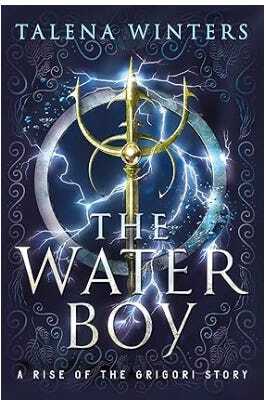
If you’re into epic historical fantasy, rolling with The Waterboy is something you’ll find enticing. Plus, you can get through this epic novella in one sitting, making it a perfect work to check out when you’re looking for a quick read during a wintry afternoon.
January 19, 2025
Lipton Matthews’ review of Progressive Myths is an enticing one

Some of my favorite book reviews come from readers whose worldview aligns with a specific author, but they don’t go to bat for them 100 percent of the time. This is what jumped out at me in Lipton Matthews’ review of Michael Huemer’s book, Progressive Myths.
One reason this jumped out at me is that I caught Tom Woods’ interview with Huemer on Episode 2560 entitled Six Progressive Myths Smashed. Both Matthews’ review and Woods’ interview are great places to snag more insight before you dive into this nonfiction work.
The Libertarian Book Reviewer is a reader-supported publication. To receive new posts and support my work, consider becoming a free or paid subscriber.
Oftentimes, we’re hit with progressive propaganda everywhere we look, from professional sports leagues to our schools, the workplace, Big Tech (I’m not buying into Zuckerberg and Co. just yet), and even on our phones when good old Apple News (I have an iPhone) pops up.
That said, it’s tough to inject some saneness into the equation, even if many of us know that we’re being hit with a dominant ideology that’s going to wrap itself in a nice, little bow. Then, it’ll present itself as if it’s the New Ten Commandments or something along those lines, and anyone who defies it is “a horrible, hateful, backward human being” on the “wrong side of history.”
But, like Neo from The Matrix, critical thinkers know something’s not right here. The problem is, a lot of us have no counterargument when we’re hit with this propaganda from every different angle.
When academia, the local and national news, and even your workplace tell you implicit bias exists, you start to believe it. Climate change as an existential threat? You start to believe that too. We can go on and on, but luckily, Huemer did the dirty work for us. So, let’s dive into Matthews’ review of a book I just added to that mountain of what I call a TBR list.
Matthews goes into detail with progressive racial mythsThe entire, “If you’re white, you’re somehow racist” quip is one I’ve never understood since there aren’t many Americans alive today who’s not descended from a group who’s been oppressed at one point or another in this nation’s history (Italians, Irish, Catholics, you get the gist).
Anyway, that’s just my take. Here’s a bulleted list of what Matthews highlighted that Huemer helped debunk:
Systemic racism
Implicit bias
Stereotype
Drug laws
Oh, and speaking of this topic, I finished listening to another episode over at the Tom Woods Show speaking about this very topic in what was an interview with Wanjiru Njoya in Episode 2595 in which she breaks down the whole “social justice” rhetoric.
Feminist MythsThis is a big one for me since I’ve literally heard firsthand accounts of ‘gender pay’ or ‘opportunity gap’ in recent years. Clearly, I was a skeptic from the get-go, and many of the accounts I heard in person seemed more entrenched in speculation. For example, “They didn’t believe I could write about (niche) because I’m a woman,” in the most melodramatic tone I’ve ever heard jumped at me the most. Anyway, here are the topics Matthews covered:
Gender pay gap
Sexual assault statistics
Speaking on the latter bullet point, this topic is clearly ultra-sensitive to many, and the numbers, as opposed to “25 percent of women are sexually assaulted during college,” Matthews is quick to point out that “he (Huemer) argues that the true figure is between 1 percent and 5 percent, based on more rigorous data.”
That said, Matthews ended the section with this wise statement:
“While this does not diminish the severity of actual sexual assaults, it punctures the progressive doctrine that false accusations are exceedingly rare.”
One of the claims I’ve personally heard here is that, somehow, those of us who don’t believe the numbers thrown in our faces undermine that sexual assault is a severe thing. That’s not the case, and Matthews showed a lot of class by including the quote.
Wealth MythsIf a progressive got nothing else out of this book, I’d love for them to at least appreciate a fact that Huemer laid out and Matthews echoed regarding US millionaires and inheritances. That number rested at around the fact that:
79 percent, in fact, did not inherit the wealth of a previous generation
This should put a lot of people at ease. Why? Well, it means one thing: Anyone can climb the ladder to wealth if they take ownership of their lives and realize that only they have the power to achieve the life they want.
Thanks for reading The Libertarian Book Reviewer! This post is public so feel free to share it.
One day, I’ll add my own review of this book, and I may dedicate an entire article to this topic. Heck, I know a guy who went from, “growing up poor and knowing what real cold felt like” to “knowing what a million bucks looks like.” I should mention here that he also lives debt-free.
Yeah, it’s possible. And the best thing a progressive can do, instead of trying to cherry-pick a way to refute the number shared above, is to strive to improve their own well-being. Find market demand for something, create something around that demand, be resourceful, then sell what you created.
Pseudo-Scientific MythsI think we all know where Huemer (and Matthews) were going with this one. It may’ve been in the news a lot lately, what with wildfires in Los Angeles and hurricanes in the Southeast. I mean, of course, I’m talking about:
Climate change
And public health
Let’s elaborate a little on that first bullet point:
I love the fact that Huemer doesn’t go as far as to deny the existence of global warming. Among many libertarians whose content I’ve read and who I’ve listened to on podcasts, every single one of them concedes that global warming itself is a thing.
But Matthews also said Huemer:
Not a Perfect Book“critiques alarmist narratives that predict imminent societal collapse. Rather than reinforcing alarmist sentiments, Heumer contends that mainstream scientists such as Adam Schlosser and Michael Mann concur that the probability of climate change leading to human extinction is low.”
Listen, there’s never been a perfectly-written book, and it’s why I love reading some honest critiques of my own work, and that of any book that I plan on buying. Matthews pulls no punches here.
The Libertarian Book Reviewer is a reader-supported publication. To receive new posts and support my work, consider becoming a free or paid subscriber.
In short, he asserts that Huemer definitely could’ve done a better job with the following:
Myths Huemermentioned have already been debunked and could have instead built on what’s already been written
Like so-called racial injustice
He wrote nothing on racial disparities and income
Huemer could have elaborated more on debunking extreme climate change
He should have cited more recent sources scrutinizing the “gender pay gap”
No, not a perfect book, but a perfect reviewPerfect reviews should work in two ways: They need to highlight the book’s strengths but expose their weaknesses. Matthews did that since he didn’t go wild and shout “5 stars, go buy your copy” from the rooftops.
And thank goodness, too. Instead, he gave Huemer, or someone out there, a blueprint to write a follow-up book. So, if preferably Huemer does that and further debunks these myths while adding new material, libertarians (and conservatives) have more intellectual stock to further put the myths listed above to sleep.
Okay, maybe not to sleep, since there will always exist a contingent of steadfast progressives who will hear nothing other than the talking points of those fueling their own worldview. But by providing more resourceful information on the topic, complete with sources, might I add, there will be enough evidence to at least change people’s minds.
Matthews provides plenty of those sources in his review, so the ball’s rolling.
